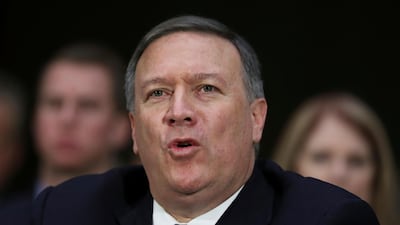Geopolitical risks to energy markets used to emanate mainly from Moscow, Baghdad, Tehran or Caracas. The latest upheaval in the US administration, with Rex Tillerson’s departure as Secretary of State, threatens to add Washington to that list of capitals. And major energy producers are in the firing line.
The State Department’s new head Mike Pompeo, previously of the CIA, has, like Donald Trump, been notably hostile towards the Iran nuclear deal, and conspiratorial on Russia. Rumours continue to swirl over the possible replacement of National Security Advisor H.R. McMaster, potentially by the uber-hawkish John Bolton, a prominent promoter of the 2003 invasion of Iraq.
Mr Tillerson’s tenure as Secretary of State was an odd contrast to his time at ExxonMobil. Cocooned in the “God pod” at the oil company’s headquarters outside Dallas, its senior executives can sometimes be aloof. His ability to manage a large organisation should not have been in doubt, but he leaves behind a legacy of organisational chaos, downsizing and plummeting morale at the State Department.
But while he made some major strategic missteps as ExxonMobil’s chief executive – in Russia, Iraq and buying the US shale company XTO – his attempted policies as Secretary of State were, in comparison, generally sound and conventional. Mr Pompeo promises a much more volatile ride.
There are four clear global trouble spots which might significantly affect oil and gas markets, and will test the mettle of Mr Pompeo.
First up, Venezuela’s slow-motion collapse is now accelerating, with production down more than 50,000 barrels per day from January to February, according to independent observers. Tougher sanctions on Caracas to prevent it sending crude to the US, the refinancing of its debts, or a renewed push for a change of government could cut current exports of crude from about 1 million barrels per day to near-zero.
Russia and China, which have lent the Maduro regime huge sums, may then get involved in a phenomenally messy default, while attempting to preserve a foothold in the western hemisphere.
Second, Russia itself is still under western sanctions that hamper its development of Arctic and shale resources. After Mr Tillerson’s condemnation of Russia’s alleged chemical weapons attack in the UK, the White House’s support for its British ally has been muddled. Disputes over Ukrainian gas transit add further risk.
Thirdly, a Russian state company, Zarubezhneft, has just signed the second post-sanctions petroleum development contract with Iran, after July’s agreement with Total of France and the China National Petroleum Corporation.
_______________
Read more:
The gas that came in from the cold
Oil majors get serious on 'new energy' investments
Oil beyond 2018: what lies ahead for 'Super Opec'
_______________
Meanwhile, European attempts to find an acceptable “fix” for Iran’s nuclear deal seem doomed. New proposals from the deal’s opponents are clearly intended to be an ultimatum beyond anything Iran could accept, especially as Tehran feels it is already not receiving the promised economic benefits from the 2015 accord.
Despite suggestions that reimposed US sanctions could again cut Iranian oil exports by 1 million barrels per day, the actual immediate impact is likely to be minimal. The EU, and even more China and Russia, the other deal signatories, still consider Iran to be in compliance, and will try to shield their companies from American interference.
Nevertheless, future investment in the Iranian energy sector would be severely constrained. More seriously, Messrs Pompeo and Bolton might push for a military end to Iran’s nuclear activities, which could suck in neighbouring petroleum producers and lead to unpredictable wider damage.
The final venue of threat, North Korea, again draws in China and to an extent Russia in opposition to the US. Not a notable energy consumer or producer itself, Pyongyang’s nuclear weapons raise the spectre of a wider conflict that could devastate South Korea, draw in Japan and disrupt oil and gas transit and demand across north-east Asia.
Even if Mr Trump’s reshaped team identifies the right policies, it is doubtful that the State Department’s eviscerated diplomatic corps can deliver the complex manoeuvres required for a deal in Korea, a consensus with the Europeans on a modified Iran deal, a Latin American push for peaceful political change in Venezuela, or a united western front against Russia.
But energy producers and investors should not treat the Washington reshuffle as a one-way ticket to higher revenues. A loss of Venezuelan or Iranian oil exports would presumably be made up by spare capacity from other Opec producers, who would suspend or greatly revise the ongoing production cut agreement. A sharp spike in prices followed by a global recession would be inadvisable. Similarly, a west-Russia showdown would cast doubt on Moscow’s continuing adherence to its pact with Opec.
The critical mass of great power rivalry, massive conventional arms and nuclear weapons makes the Korean situation the most critical. It may be far from the Arabian Gulf, but even a contained conflict here would severely hit demand for oil and, even more, liquefied natural gas.
While our eyes are on the obvious hotspots, it is possible the next shock may emerge from an entirely unexpected area – a tariff-triggered trade war, China, a new economic crisis, a massive cyberattack - testing an understaffed and chaotic US administration. With old alliances under strain and new ones nascent or paradoxical, energy producers are set for another testing year.
Robin M. Mills is CEO of Qamar Energy, and author of The Myth of the Oil Crisis


